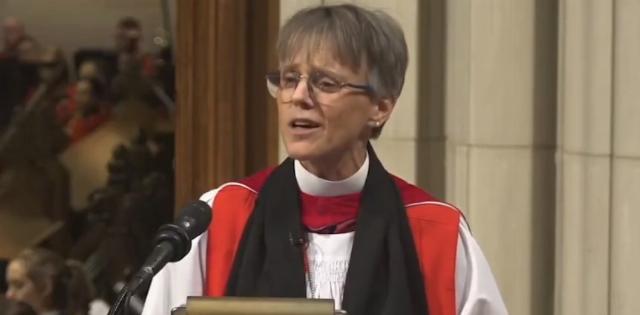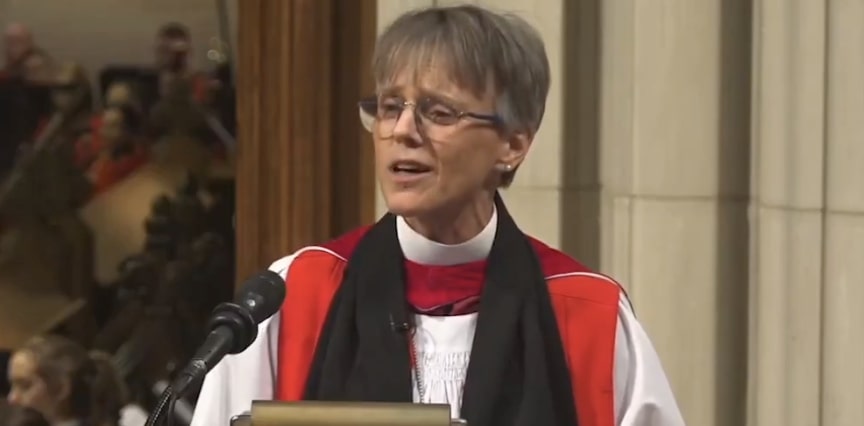

Photo Credit:Image from X.
In 11th grade, my teacher quipped that the Episcopal Church was “the Republican Party at prayer.” That clever observation captured the church’s alignment with tradition and conservatism—an alignment that has since faded into history. Today, the Episcopal Church is almost unrecognizable—and nowhere is this more evident than in the public actions of Bishop Mariann Edgar Budde.
For years, Bishop Budde has leveraged her position not to shepherd her flock, but to wage ideological battles, often targeting former President Donald Trump. Her most recent comments on The View—where she claimed to be “trying to speak a truth that needed to be said”—follow a familiar pattern. In 2020, she seized headlines by condemning Trump for holding a Bible in front of St. John’s Episcopal Church. While progressive commentators applauded her, others saw her rebuke as a glaring example of the church’s growing politicization. Budde seemed more interested in scolding the president than grappling with the pressing challenges facing her city and her nation.
Budde’s latest remarks are no less troubling. On The View, she lamented the “culture of contempt” and called for bringing “other voices into the conversation.” But for many conservatives, her words ring hollow. The Episcopal Church she represents has systematically sidelined dissenting voices, leaving conservative parishioners and even entire dioceses feeling alienated and unwelcome, prompting their departure. It is difficult to take Budde’s call for inclusivity seriously when her denomination has spent decades alienating those who hold traditional beliefs.
This fracturing mirrors the broader polarization of American society, which has not only impacted religious institutions like the Episcopal Church but also every corner of contemporary American life. The Episcopal Church is hardly unique in experiencing such a split; other denominations have also been deeply affected by the cultural and political divides that now define the nation. The exodus of dioceses like Fort Worth and South Carolina underscores the depth of the church’s ideological shift. Fort Worth broke away after years of doctrinal disputes, winning a Texas Supreme Court ruling in 2020 that affirmed its right to retain its property. South Carolina followed a similar path, citing issues ranging from the redefinition of marriage to questions of Biblical authority. These departures reflect a broader divide within the Episcopal Church—a liberal-conservative split over core issues like ordination, Biblical law, and the church’s role in addressing cultural shifts.
At the heart of this polemic between the progressive leadership of the Episcopal Church and a more conservative president lies a profound irony. The Episcopal Church is descended from the Church of England, a national church established by King Henry VIII, to facilitate, of all things, a divorce. For centuries, the Church of England functioned as a uniquely nationalist institution, closely tied to the identity and governance of the British state and reigning monarch. Even in America, the Episcopal Church served as the official state church in several colonies-turned-states years after the American Revolution. It was a church deeply entwined with notions of Christian nationalism long before the term entered modern political discourse.
The Episcopal Church’s leadership—including Budde—has long denounced “Christian nationalism” when it is associated with conservative political movements. This position reflects a broader pattern of selective engagement in political debates, where faith is fused with progressive ideology to the apparent exclusion of dissenting voices. This historical legacy of alignment with national power underscores the irony of the Episcopal Church’s modern rebukes of Christian nationalism, as a church with deep nationalist roots and a history of state sponsorship now accuses conservative Christians of conflating faith with patriotism—all while embracing advocacy that aligns with leftist political causes. For example, the presiding bishop’s letter condemning the Trump administration’s immigration policies demonstrates the denomination’s willingness to use its platform to advance political goals, often cloaked in the language of moral clarity.
Budde’s alignment with these positions and her ongoing public rebukes of Trump further highlight the hypocrisy at play. The Episcopal Church has embraced a progressive framework that espouses tolerance but often marginalizes dissenting voices—particularly conservative ones. When Trump critiques open-border policies, woke indoctrination, or the failures of DEI, he is vilified as divisive. Yet when Budde castigates him from the pulpit—or the set of The View—she is lauded for her courage and moral clarity, exposing the double standard in how political engagement is portrayed depending on the source and point of view.
For many in this nation, Trump speaks directly to the challenges facing everyday Americans. His policies on immigration, for example, address the practical realities of an overwhelmed border system—something the Episcopal Church’s platitudes about “compassion” fail to solve, much less acknowledge that they were created in the first place under the guise of compassion. While Budde lectures Trump about moral leadership, she offers no solutions for the very real crises that his policies seek to address.
Her alignment with the presiding bishop’s positions—including advocacy against Trump administration policies—is emblematic of leadership that merges faith with progressive ideology while condemning similar actions from conservative Christians. This double standard highlights the hypocrisy in portraying the Episcopal Church’s political engagement as morally superior while dismissing opposing perspectives.
The Episcopal Church’s decline is not merely a story of shrinking membership—it is a warning of the consequences when an institution trades its core principles for fleeting cultural approval. In seeking to align itself with the values of the elite, the church has abandoned the spiritual vitality that once defined it, alienating the very people who once filled its pews and sustained its mission.
For Bishop Budde, perhaps it is time to pause and reflect—not on the policies or positions of Donald Trump, but on whether she and the Episcopal Church’s leadership have focused too much on the speck in their neighbor’s eye while ignoring the beam in their own. The polarization within the Anglican movement, and the Episcopal Church’s role in deepening that divide, warrants more concern than aggressively inserting themselves into deeply polarizing political debates. If she genuinely believes in inclusion, she might reflect on how to reconcile with those her church has alienated. If she genuinely believes in humility, she might reconsider whether the pulpit is the appropriate platform for advancing partisan causes. And if she genuinely believes in truth, she might pause to reflect on how often progressives in the pulpit treat truth as personal, relative, and flexible—until they insist it is not.
Charlton Allen is an attorney and former chief executive officer and chief judicial officer of the North Carolina Industrial Commission. He is the founder and editor of The American Salient and the host of the Modern Federalist podcast.
<img alt="Image from X." captext="Twitter” src=”https://conservativenewsbriefing.com/wp-content/uploads/2025/01/a-sermon-on-the-mount-of-modern-progressivism.jpg”>





